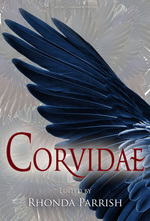
Today is release day for my anthology Speculative Story Bites, and I'm fully aware that most of the people in my life have no idea what I actually do as an editor and publisher. My colleague and friend Rhonda Parrish also wrote a great blog on this topic, answering the question, “So like, you just fix all the typos and then you get to have your name on the cover?”
The short answer: no, that's not what an anthology editor does at all. First of all, this particular anthology is a bit of an oddball. Before I took over as editor-in-chief of World Weaver Press, I was reading submissions for another anthology we were supposed to publish. It was, however, to be the third in a series of anthologies, and when the plug got pulled on the second in that series, I couldn't exactly go ahead with publishing the third. Speculative Story Bites contains several stories I salvaged from that submissions period, several I salvaged from the other cancelled project, and several that I solicited directly from World Weaver Press authors. It's a bit of a mish-mash of stories, but I adore each and every one of them, and I hope readers will find at least a few they love. Most anthologies don't have that kind of complicated background, but this one is pretty special to me because it does. So what does an anthology editor do? Without going into too much technical detail, here are the basic steps that an editor and/or publisher has to go through to bring an anthology to your bookshelf or Kindle. 
Conceive a Theme or Angle
Since an anthology is a collection of short stories by various authors, it is usually centered around a theme. That theme may be broad—the theme of Speculative Story Bites is "speculative fiction under 4000 words"—or it may be narrow-- for example, Rhonda Parrish's anthology Corvidae is focused on fantasy stories about crows, magpies, and other "corvid" birds, and Kate Wolford's anthology Frozen Fairy Tales is all about fairy tale retellings set in winter. At this point, the editor and publisher must also decide on guidelines for writers, including how long or short a story can be, what genres are acceptable, and how much writers will be paid. Solicit Stories or Open for Submissions Soliciting means approaching authors individually to ask if they are willing to contribute a story. Opening to public submissions requires posting the guidelines to market websites such as Duotrope and Submission Grinder, sharing the call for submissions on social media, passing around handbills at conventions, hanging flyers in hipster coffee shops, or however else you plan to reach writers. Read Slush and Send Rejections or Acceptances "Slush" refers to the stories from a public open submission period. For the anthology that Speculative Story Bites was originally supposed to be, we received nearly 350 submissions. Some, I only read the first few paragraphs and could tell they were either not well-crafted, or not right for my vision. Others, I had to read multiple times to decide. Most stories received a copy-and-pasted form rejection, but some received personalized feedback about why they were not accepted. Narrow Down the Shortlist Once I picked the stories that were well-crafted and fit my vision, then came the gut-wrenching decisions about which ones to actually include. Maybe some are too similar to each other, maybe one just didn't fit as well as I thought, maybe another wasn't as memorable. These are the rejections I really hate to send. Usually at World Weaver Press, we seek a second opinion from another editor to help with this stage. For Speculative Story Bites, I had help from assistant editor Laura Harvey, as well as then-intern Rae Oestreich. Issue Contracts and Payments Payment terms should already be included in the submission guidelines, so writers know what to expect, but there are important details that need to be agreed upon about when payment will be issued, as well as what rights the publisher has to the story and for how long. Edit the Stories There are three stage of editing: 1) Developmental Editing: "This plot point doesn't make sense." 2) Line Editing: "This sentence doesn't make sense." 3) Copy Editing: "This comma shouldn't be here." The way I prefer to do it, the primary editor for a book does the first two, and someone else (another editor or an intern) does the third. That means the very thing that most people associate with "editing" is not even the responsibility of the editor whose name is on the cover of an anthology. Arrange the Stories There's an art to deciding which story goes first or last in an anthology, and how to order them throughout for balance and emotional impact. Format the Book Often, this responsibility falls to the publisher rather than the editor, but since I'm both for this anthology, it's all on me. Formatting an ebook uses HTML markup language, and looks something like this inside:
Speculative Story Bites will not be available in paperback, but for anthologies that are, it requires a separate document designed according to the printer's specifications. Here, we get to have tons of fun with headers, section breaks, margins, kerning, leading, gutters, and various other typographical details that most people don't even realize exist.
Create Cover Art Again, this is not usually the editor's responsibility, but the editor may at least have to contribute ideas or feedback on cover options. I made the silly little cover for Speculative Story Bites myself, and it was much simpler than the covers I made for Campaign 2100, Char, and Murder in the Generative Kitchen, largely because it is ebook only. Creating a full-wrap cover for a paperback is much more complicated. (We don't even mess with hardbacks...) Upload to Bookselling Venues Our books are sold at Amazon, BarnesandNoble.com, Kobo, and sometimes iTunes and Omnilit. Each one has slightly different requirements and systems. iTunes, for example, won't accept any file that includes Amazon links. Omnilit needs the cover to be a certain number of pixels. Amazon requires a different file format than all the others. Aside from just uploading the file and hitting "publish," this stage also requires selecting appropriate keywords and categories, and making sure the book description and author names all show up correctly. Market the Book Once you've created an anthology, you still have to convince people to read it. This involves some combination of sending copies to review outlets, bloggers, and street teams, hosting giveaways, sending out email newsletters, attending conventions, participating in blog tours, social media posting, paid advertising (preferably with effective venues such as Bookbub or EReaderNewsToday), and various other types of voodoo. I hope this has provided some insight into how an anthology gets put together, and why an editor or anthologist may give you a death glare if you assume it's all about typos, Have questions? Leave a comment!
16 Comments
5/15/2017 05:44:29 am
Hello Sarena,
Reply
5/15/2017 06:35:02 am
Hi David,
Reply
1/22/2018 05:14:30 pm
I'm glad this was helpful! Yes, I pay writers for anthology stories. I believe it is important to do so. I prefer paying up front, either a flat rate or a per-word rate. WWP has done some royalty-share anthologies, and I've had to send some of those authors royalty checks that are less than the value of the stamp on the envelope I send it in. With an active, collaborative marketing plan, that could work out very differently.
Reply
4/20/2018 06:31:01 am
Hello Sarena,
Reply
4/20/2018 12:55:12 pm
Hi Anna,
Reply
4/22/2018 07:32:20 am
Hello Sarena, 4/22/2018 04:56:51 pm
Ah, that's unfortunate. (And I suspect I know who, now.)
Reply
4/23/2018 01:27:01 am
As I plunge into the writing and publishing world more and more, I realize that I need to distinguish between the well-meaning and otherwise. There are politics, just like the corporate world. Advice are everywhere and the amount of information on its own is enough to overwhelm me. I still have to figure out the truly helpful from those with hidden motives. I am happy that a fellow author I trust referred me to this post of yours.
Reply
kateshowalter
7/16/2018 12:14:50 pm
Hi Sarena,
Reply
7/16/2018 01:06:12 pm
This is a good question, and I have mixed feelings about it. Generally, when I see that an editor has included their own story in an anthology, it puts me off. I know that story didn't go through the same slush pile competition and editing that the others did. It's sort of the ultimate form of nepotism. I don't think it's unethical, but I tend to get that same sort of icky feeling you describe when I come across it.
Reply
kateshowalter
7/17/2018 04:51:31 am
Thank you so much for your reply. Very helpful.
Bob
10/14/2019 11:52:02 pm
Hi Sarena!
Reply
10/15/2019 06:28:35 am
Thanks, Bob! I'm glad this was helpful to you.
Reply
Regina Medina Alvarado
9/6/2020 10:16:43 am
I had a few of my poems published in various Anthologies by the now defunct Poetry.com. Do I even need to mention those past publications in a book of my own making, even though I hold the copyright to my poems?
Reply
9/6/2020 01:07:15 pm
Generally, it's customary to credit the original publisher when it is a reprint, just something on the copyright page or acknowledgements page that says "originally published in x". However, since Poetry.com is a known vanity press, I don't think that's necessary in this situation.
Reply
Leave a Reply. |
Archives
January 2024
Categories
All
|

 RSS Feed
RSS Feed